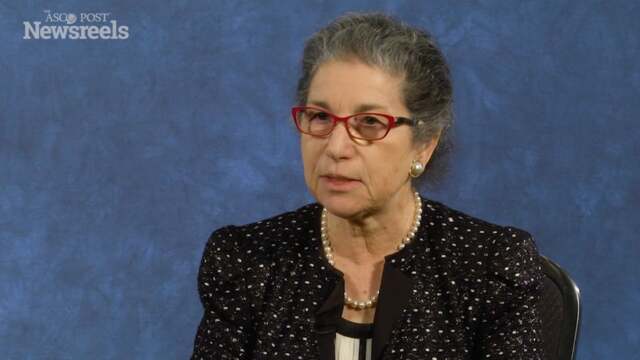Utilizing Physiatrists to Evaluate and Manage Cancer-Related Cognitive Impairment
Chemotherapy-associated cognitive dysfunction, often referred to as “chemobrain” or “chemofog,” is a common occurrence during active cancer treatment and may continue after treatment is completed. However, since treatment other than chemotherapy, including radiation therapy, surgery, and hormonal...
FDA Removes Risk Evaluation and Mitigation Strategy Requirements for Erythropoiesis-Stimulating Agents
On April 13, the U.S. Food and Drug Administration (FDA) removed the risk evaluation and mitigation strategy (REMS) requirements for the use of epoetin alfa and darbepoetin alfa to treat patients with anemia due to associated myelosuppressive chemotherapy. The Agency's announcement regarding...
Preclinical Research Suggests Potential Therapy for 'Chemobrain'
Findings offered by a University of Kansas (KU) researcher at the national meeting of the American Chemical Society in early April suggest a possible therapeutic intervention for “chemobrain,” the cognitive impairment that plagues up to a third of cancer patients following chemotherapy. ...
Acupuncture for the Management of Hot Flashes
The ASCO Post’s Integrative Oncology series is intended to facilitate the availability of evidence-based information on integrative and complementary therapies commonly used by patients with cancer. In this installment, authors Jun J. Mao, MD, MSCE, and Jyothirmai Gubili, MS, present a case study...
Expert Point of View: Ann H. Partridge MD, MPH
Ann H. Partridge MD, MPH, Director of Adult Cancer Survivorship Program at the Dana-Farber Cancer Institute, praised the “tremendous work” of Dr. Paskett and her colleagues but referred to the findings as “disappointing to say the least.”1 “Developing interventions to prevent or treat lymphedema...
Search Continues for Effective Way to Prevent Lymphedema in Breast Cancer Survivors
There was no difference in the incidence of lymphedema at 18 months in breast cancer patients randomized to a physical therapy intervention with education materials compared with a control.1 Although poor adherence to the intervention may have been a factor, these results, described as “very...
Dexamethasone Mouthwash in Preventing Everolimus-Related Stomatitis in Women With Breast Cancer
In the phase II SWISH study reported in The Lancet Oncology, Rugo et al found that use of a dexamethasone-based mouthwash may prevent everolimus-related stomatitis in postmenopausal women receiving everolimus (Afinitor) for hormone receptor–positive, HER2-negative metastatic breast cancer....
Laura E. Panattoni, PhD, on Costs of Preventable Emergency Department Use
Laura E. Panattoni, PhD, of the Fred Hutchinson Cancer Research Center, discusses results from a regional study on emergency department costs during cancer treatment and the need to focus on managing symptoms (Abstract 2).
Ethan M. Basch, MD, on Symptom Control and Quality: The Patient’s Voice
Ethan M. Basch, MD, of The University of North Carolina at Chapel Hill, discusses programs—now rolling out at various institutions—that use direct patient reporting of symptoms as a part of quality assessment (Posters 61, 81; Abstract 218).
Comparison of Pharmaceutical, Psychological, and Exercise Treatments for Cancer-Related Fatigue
Exercise and/or psychological therapy may work better than medications to reduce cancer-related fatigue and should be recommended first to patients, according to a Wilmot Cancer Institute-led study published by Mustian et al in JAMA Oncology. “If a [patient with cancer] is having trouble...
Feasibility of Patient Reporting of Adverse Events in Cancer Clinical Trials
In a study reported in JAMA Oncology, Basch et al found that use of patient-reported outcome questionnaires to report symptomatic adverse events was feasible in the setting of multicenter cancer treatment trials. Study Details In the study, 361 consecutive patients enrolled in 1 of 9 U.S....
FDA Approves Telotristat Ethyl for Carcinoid Syndrome Diarrhea
On February 28, the U.S. Food and Drug Administration (FDA) approved telotristat ethyl (Xermelo) tablets in combination with somatostatin analog therapy for the treatment of adults with carcinoid syndrome diarrhea that somatostatin analog therapy alone has inadequately controlled. About...
Patient-Reported Outcomes for Assessing Symptom Burden in Patients Receiving Oral Anticancer Therapy
In a study reported in the Journal of Oncology Practice, Mackler et al found that use of a validated symptom assessment tool for patient-reported outcomes was feasible in evaluating symptom burden in outpatients receiving oral anticancer treatment in the clinical setting. Study Details The study...
Palliative Radiation Therapy for Bone Metastases: Update of an ASTRO Evidence-Based Guideline
The American Society for Radiation Oncology (ASTRO) recently published an updated clinical guideline that underscores the safety and effectiveness of palliative radiation therapy for treating painful bone metastases. Based on recent clinical trial data, the guideline recommends optimal radiotherapy ...
Managing Patients With Low-Risk Neutropenic Fever at Cleveland Clinic Taussig Cancer Institute
In a study reported in the Journal of Oncology Practice, Goodman et al described a management practice for low-risk neutropenic fever in cancer patients that has reduced in-patient stay with intravenous antibiotic use at Cleveland Clinic Taussig Cancer Institute. Study Details In the study,...
Randomized Trial Demonstrates Benefit of Scalp-Cooling in Prevention of Chemotherapy-Induced Hair Loss
A scalp-cooling device was found safe and effective in preventing chemotherapy-induced hair loss in women undergoing adjuvant treatment for breast cancer in an interim analysis of the first prospective, randomized trial of a modern scalp-cooling system. The study was presented at the 2016 San...
How Does Sublingual Fentanyl Measure Up Against Subcutaneous Morphine in Managing Cancer Pain?
An Italian single-center trial compared treatment with sublingual fentanyl tablets and subcutaneous morphine in managing severe pain episodes in cancer patients receiving opioid treatment. In the Journal of Clinical Oncology, Zecca et al reported that the trial did not show noninferiority of...
Electra D. Paskett, PhD, on Preventing Lymphedema: Results of a CALGB Study
Electra D. Paskett, PhD, of The Ohio State University Comprehensive Cancer Center, discusses an intervention that increased knowledge of lymphedema in breast cancer, and the personal story that drove her research (Abstract 104).
Expert Point of View: Kanti R. Rai, MD
Kanti R. Rai, MD, Professor of Medicine, Hofstra Northwell School of Medicine, New Hyde Park, New York, commented on these study findings. “I congratulate the investigators for a work done with discipline, excellent collaboration, and speed.” “All of us who have become familiar with ibrutinib...
Ibrutinib: A Potential Option for Chronic Graft-vs-Host Disease?
Currently, there is no U.S. Food and Drug Administration (FDA)-approved therapy for chronic graft-vs-host disease—a life-threatening consequence of stem cell or bone marrow transplant—that has not responded to corticosteroids, but this may be about to change. Ibrutinib (Imbruvica) achieved...
Survivorship Symposium 2017: Physical and Psychological Factors Contribute to Decreased Physical Activity in 75% of Patients With Cancer
Although, in the past, patients with cancer were often counseled by their physicians to rest and reduce their physical activity, according to the American Cancer Society, emerging data are showing that exercise is not only safe and possible during cancer treatment, it can improve patients’...
No Increased Risk of Skeletal Events in Patients With Bone Metastases Taking Zoledronic Acid
A new study published in JAMA reported that patients with bone metastases due to breast cancer, prostate cancer, or multiple myeloma who used zoledronic acid every 12 weeks compared with every 4 weeks did not have in an increased risk of skeletal events over 2 years. In this study, Andrew L....
Comparison of Scales for Assessing Cisplatin-Related Ototoxicity in Children
In a study reported in the Journal of Clinical Oncology, Knight et al of the Children’s Oncology Group found that the Society for Industrial and Organizational Psychology Ototoxicity (SIOP) scale may be more sensitive than other classification systems in detecting ototoxicity in children...
Effectiveness of Electroacupuncture for Sleep Disturbances in Patients With Breast Cancer and Hot Flashes
Studies suggest that approximately 30% to 40% of women with breast cancer report persistent hot flashes. Nocturnal hot flashes are among the most problematic because they can contribute to poor sleep. A new study published by Garland et al in Menopause shows that electroacupuncture may be effective ...
Patricia A. Ganz, MD: Aromatase Inhibitors Data Review
Patricia A. Ganz, MD, of the UCLA Jonsson Comprehensive Cancer Center, summarizes two studies on using duloxetine for aromatase inhibitor–associated musculoskeletal symptoms, and aromatase inhibitors’ effect on endothelial function and heart disease (Abstracts S5-06 and S5-07).
Anne Hudson Blaes, MD, on Aromatase Inhibitors and Cardiovascular Disease
Anne Hudson Blaes, MD, of the University of Minnesota, discusses the association between aromatase inhibitors, endothelial function, and early heart disease (Abstract S5-07).
Jame Abraham, MD, on Hair Loss: SCALP Trial Results
Jame Abraham, MD, of the Cleveland Clinic, discusses findings of the Scalp Cooling Alopecia Prevention trial for patients with early-stage breast cancer (Abstract S5-02).
Sodium Thiosulfate Seems to Protect Against Cisplatin-Related Hearing Loss in Children With Cancer
The antioxidant sodium thiosulfate provided protection against cisplatin-related hearing loss in children with cancer, according to a phase III trial reported by Freyer et al in The Lancet Oncology. The open-label trial included 104 assessable patients (aged 1 to 18 years) from 38 Children’s ...
ASH 2016: New Data Shed Light on Potential Advantages of Pacritinib for Patients With Myelofibrosis
Compared with standard therapy, pacritinib significantly reduces spleen size among people with myelofibrosis who have very low levels of platelets, according to a late-breaking study presented by Mascarenhas et al during the 58th American Society of Hematology (ASH) Annual Meeting & Exposition...
ASH 2016: Ibrutinib Found Helpful in Treating Graft-vs-Host Disease After Stem Cell Transplant
A late-breaking abstract presented by Miklos et al during the 58th American Society of Hematology (ASH) Annual Meeting & Exposition in San Diego (Abstract LBA-3) showed patients who experience graft-vs-host disease (GVHD) after stem cell transplantation that is not resolved by corticosteroid...
Brenda M. Sandmaier, MD, and Sagar Lonial, MD, on Preventing GVHD: Clinical Trial Results
Brenda M. Sandmaier, MD, of Fred Hutchinson Cancer Research Center, and Sagar Lonial, MD, of Emory University, discuss study findings on sirolimus combined with mycophenolate mofetil and cyclosporine to improve prevention of acute graft-vs-host-disease after unrelated hematopoietic cell transplantation (Abstract 506).
Jean M. Connors, MD, and Julie Vose, MD, MBA, on Thrombosis and Anticoagulation: Best of ASH Clinical Data
Jean M. Connors, MD, of Brigham and Women’s Hospital, and Julie Vose, MD, MBA, of the University of Nebraska Medical Center, discuss a roundup of key findings on a critical area in the treatment of hematologic malignancies (Abstracts 17, 85, 86, 135, 139, 143, 273, 415, 419, 719, 877, 880).
Expect Questions About Medical Marijuana
“Whether or not individual professionals support the clinical use of herbal cannabis, all clinicians will encounter patients who elect to use it and therefore need to be prepared to advise them on cannabis-related clinical issues despite limited evidence to guide care,” according to a recently...
Medical Marijuana: The Topic You Can’t Escape
With reports about new marijuana dispensaries sprouting up as more states approve the legal use of medical marijuana, and patients and family members questioning how to get it, medical marijuana is a “topic you can’t escape,” noted Judith A. Paice, PhD, RN.1 Dr. Paice is Director of the Cancer...
Diagnosing and Managing Chemotherapy-Induced Peripheral Neuropathy
Chemotherapy-induced peripheral neuropathy is a common side effect of cancer treatment—the incidence is reported to be as high as 70% in the first month of chemotherapy1—and can cause significant disability in patients. The extent of the neurotoxicity incurred by patients varies depending on the...
Cardio-oncology in the Geriatric Patient
As cancer therapies improve and the population as a whole increases, there are rising numbers of elderly patients with cancer. More than half of patients newly diagnosed with cancer are aged 65 years or older.1 In January 2012, it was estimated that more than 8 million cancer survivors were over...
Prolonged Length of Stays, Readmissions, and Discharge to Care Facilities Among Postoperative Patients With Advanced Cancer
Patients with disseminated advanced cancer who undergo surgery are far more likely to endure long hospital stays and readmissions, referrals to extended care facilities, and death, University of California (UC) Davis researchers have found. Their study, published by Bateni et al in PLOS One,...
Dexamethasone Mouth Rinse Should Be Routine Part of Everolimus Treatment
Dexamethasone mouth rinse should be given prophylactically to prevent stomatitis associated with everolimus (Afinitor)/exemestane in metastatic breast cancer, according to Hope S. Rugo, MD, principal investigator of the SWISH trial and Director of Breast Oncology and Clinical Trials Education at...
Pearls for Managing Immune-Related Toxicities
With checkpoint inhibitors in frequent use, clinicians strive daily to balance the efficacy and toxicity of these treatments. At the 2016 Palliative Care in Oncology Symposium, Lynn M. Schuchter, MD, FASCO, the C. Willard Professor of Hematology-Oncology at the University of Pennsylvania,...
Study Finds Pneumonitis Associated With Anti–PD-1/PD-L1 Antibody Treatment
In a two-institution experience reported in the Journal of Clinical Oncology, Naidoo et al identified the incidence of pneumonitis occurring in patients receiving anti–PD-1/PD-L1 (programmed cell death protein 1/ligand 1) monoclonal antibody as monotherapy or combined with anticytotoxic...
Olanzapine Combination Reduces Nausea and Vomiting in Patients Receiving Highly Emetogenic Chemotherapy
According to a phase III trial reported by Navari et al in The New England Journal of Medicine, the addition of the antipsychotic agent olanzapine vs placebo to dexamethasone, aprepitant, or fosaprepitant, and a 5-hydroxytryptamine type 3–receptor antagonist reduced nausea and improved antiemetic...
Stephen T. Sonis, DMD, DMSc, on Radiotherapy-Induced Oral Complications
Stephen T. Sonis, DMD, DMSc, of Dana-Farber Cancer Institute, discusses the epidemiology, pathogenesis, and scope of oral complications of radiation therapy.
Joseph A. Greer, PhD, on An App for Adherence to Oral Chemotherapy
Joseph A. Greer, PhD, of Massachusetts General Hospital, discusses the development of a mobile application to address treatment adherence and symptoms (Abstract 104).
Tracy A. Balboni, MD, MPH, on Managing Spinal Metastases With Radiation Therapy
Tracy A. Balboni, MD, MPH, of the Dana-Farber Cancer Institute, talks about how to preserve quality of life in the presence of complex spinal lesions, including novel ways to assess spinal instability and treat metastases.
FDA Approves Extended-Release Granisetron Injection for the Prevention of Chemotherapy-Induced Nausea and Vomiting
The U.S. Food and Drug Administration (FDA) has approved an extended-release version of granisetron (Sustol) for the prevention of chemotherapy-induced nausea and vomiting, according to a news release by Heron Therapeutics, the drug’s manufacturer. Granisetron is an extended-release, injectable...
Scalp Cooling for Chemotherapy-Induced Alopecia Becoming Mainstream
Hair loss can be a devastating side effect of chemotherapy, but the recent U.S. Food and Drug Administration (FDA) approval of the DigniCap Cooling System and the growing acceptance of scalp-cooling methods in the United States may improve the quality of life for many patients receiving...
FDA Approves Extended-Release Granisetron Injection for the Prevention of Chemotherapy-Induced Nausea and Vomiting
Heron Therapeutics, Inc, announced on August 10, 2016, that the U.S. Food and Drug Administration (FDA) has approved granisetron (Sustol) extended-release injection. Granisetron is a serotonin-3 (5-HT3) receptor antagonist indicated in combination with other antiemetics in adults for the prevention ...
More Focus Needed on Chemotherapy-Induced Nausea as a Cluster of Symptoms
Management of chemotherapy-induced vomiting has improved with the use of antiemetics, but chemotherapy-induced nausea remains a major clinical problem, according to Alex Molassiotis, RN, PhD, Professor and Head of the School of Nursing at The Hong Kong Polytechnic University. And, he added, the...
Use of Dexamethasone Mouthwash in Managing mTOR Inhibitor–Associated Stomatitis in Patients With Breast Cancer
Prophylactic use of dexamethasone mouthwash significantly minimized the incidence of all grades of stomatitis in postmenopausal women receiving everolimus (Afinitor, Zortress) and exemestane for the treatment of hormone receptor–positive metastatic breast cancer, according to data presented by...
Dealing With GI Toxicities After Chemoradiation
Chemotherapy- and radiotherapy-induced gastrointestinal (GI) toxicities have risen alongside improved survival rates for many cancers, according to Jervoise Andreyev, MA, PhD, Consultant Gastroenterologist in GI Consequences of Cancer Treatment at the Royal Marsden Hospital in London. “For every...











